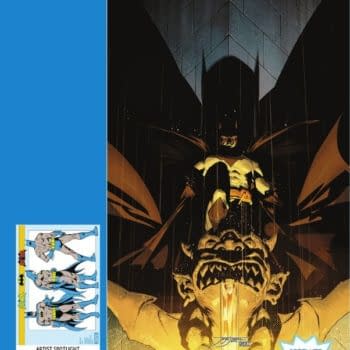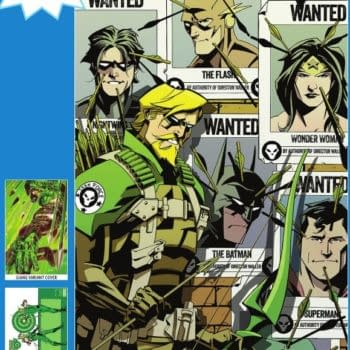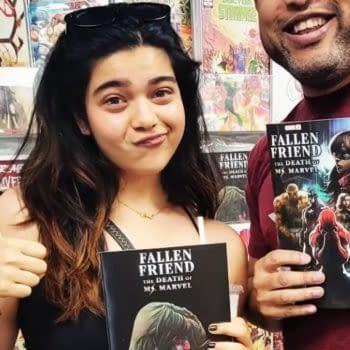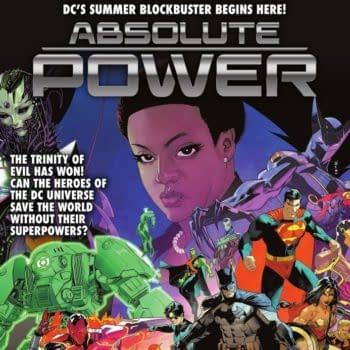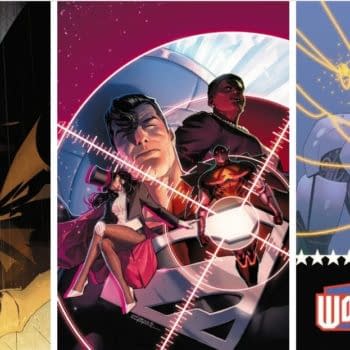Posted in: Look! It Moves! by Adi Tantimedh | Tagged: amc, Comics, steven grant, tv, walking dead, zombies
Look! It Moves! by Adi Tantimedh #76: More Dead, More Walking, Less Braaains!
So everyone seems to be raving about the WALKING DEAD TV series.
Alas, I'm not one of them.
Sure, I'm happy for Robert Kirkman, Tony Moore and Charlie Adlard for their success, given how hard it is to get any show or movie made these days, the production values and quality of acting in the show are as good as money can buy, the crews work their arses off to make the show look as good as it does, but story-wise, it doesn't really do it for me, even if I prefer to have it on in the background over any other network show when I'm typing.

I was struck in an interview with Kirkman and Frank Darabont, the show's executive producer and writer-director of the pilot, in Entertainment Weekly a few weeks ago where they basically rejected the use of metaphor subtext and satire in the story, as if deeper thinking and layering in storytelling was a bad thing. I found that attitude really weird. Is it that Americans have always been uncomfortable with the notion of Irony, which metaphor and satire tend to be lumped in? I always had the feeling that many Americans think Irony is elitist and snobby, hence etc, etc. There's an anti-intellectual vibe there.
But here's the thing, when you reject making up your own overt subtext, unintentional subtext will end up bubbling up and doing its job whether you like it or not. From what I could gather in the WALKING DEAD comics and TV series, the main theme seems to be "might makes right". After all the guilt and hand-wringing and angst, series hero Rick tends to pick up his gun and blow away the right people and threaten the rest in order to force everyone to behave sensibly and not get them all killed. This could be read as the unintentional subtext: how America tends to see itself when faced with frightened and venal people who don't behave. As a running theme for an ongoing story, it's perfectly workable, but without added layers of, say, metaphor and satire and what have you, what we're left with is melodrama, where everything is on the surface, on-the-nose, with no subtlety, no room for further thought beyond soap opera, mawkish, angsty hand-wringing and crying, of which we've already had plenty of in the first episode, let alone the next four after it. And then things get complicated and worse after that, because that's the nature of serial soap opera. WALKING DEAD is essentially a soap opera that just happens to have zombies as the fuel to keep its engine running.

But back to zombies. Zombie movies before THE WALKING DEAD were generally treated as devices for metaphor, satire and social commentary. It all goes back to George Romero's NIGHT OF THE LIVING DEAD, which started the trend in the first place, and there he was deliberately alluding to, without saying outright, issues involving Civil Rights unrest and racism. DAWN OF THE DEAD was the movie that hammered home his use of the zombie metaphor to comment on mob mentality and blind consumerism by sending his zombies to the mall. Even Zack Snyder's 2004 remake (the only Zack Snyder movie I actually like) pushed through an accelerated variation on Romero's themes by adding some post-911 anxiety into frenzied, nihilistic indulgences the survivors took to in the mall. Romero's DAY OF THE DEAD turned out to be at least 15 years ahead of its time, since if you view it today, in light of the atrocities in the Iraq War and Abu-Ghraib, it turns out to be spookily prescient in the way it portrays the callousness of bored soldiers sadistically torturing zombies for laughs.
I guess I'm just one of those people who like a bit more meat and fibre on the bones of the stories I consume rather than just the fat and sugar. Zombies and the Horror genre in genre used to be talked about by serious people as a storytelling form entirely rich in metaphor, a perfect structure for exploring ideas and themes. It's only been in the first decade of the 21st Century that the notion of horror movies with no real subtext has sprung up, with a growing geek movement for indie, underground and badly-made horror that generally indulged in blood and gore for its own sake, like if you image the SAW movies with even less ideas, concentrating mainly on the psychopath's point of view while he – for it's usually a man – stalks, violates, maims and murders his victims. The recent documentary S&MAN tried to explore the pathologies driving the appeal of this recent cultural movement and ended up with more questions than answers. Sadistic violence has become the only text.
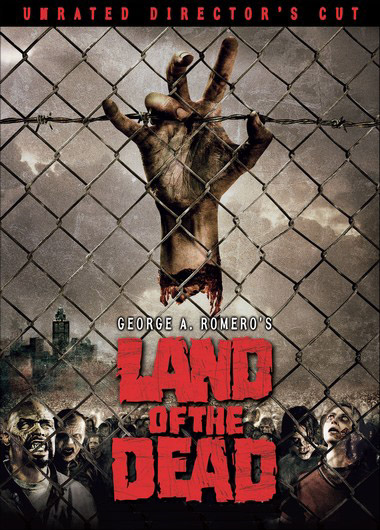

Romero's big budget blowout LAND OF THE DEAD was chockfull of satire and commentary on post-911 paranoia, the War on Terror and Class Warfare as the rich lived in luxurious gated compounds while the have-nots are left outside to mercy of the hungry dead. Even the French movie LES REVENANTS, or THEY CAME BACK, used the returned dead as a device to explore social malaise: these zombies didn't eat anyone, could think and talk, and tried to continue with their former lives, but the fears of their grieving families and the government ultimately disposes of them for simply being socially undesirable and too expensive to keep around.
It's been in this decade that zombies truly became a massive cultural trend, and THE WALKING DEAD is part of it. Zombie novels finally became a viable commercial genre, with Max Brooks' WORLD WAR Z becoming a bestselling and now languishing in movie development hell.

SHAUN OF THE DEAD is filled with satire taking the piss out of British ineptitude in the face of the zombipocalypse. For my money, Charlie Brooker's DEAD SET is the best of this century's zombie stories, bringing the zombipocalypse to the Big Brother house and mercilessly implicating us the viewers in the creation of a society of voyeurs and the unending gaze, concluding that everyone deserves what's coming to them, including the rest of us.

Romero's most recent entries DIARY OF THE DEAD and SURVIVAL OF THE DEAD, even as low-budget affairs, were thick with social commentary. DIARY looked at the narcisstic nature of the Youtube generation. SURVIVAL is a quasi-Western melodrama about generations-long feuding families whose mutual hatred lasts even into the zombipocalypse. Maybe there was a sense of metaphor fatigue setting in here, since neither got as much attention as you might expect.
So where does this leave the popularity of THE WALKING DEAD? It's proof that zombies are at the peak of their mainstream acceptance, having made it to TV. And without the fuss of metaphor and satire. A lot of people tend to assume TV drama is shallow and lacking in depth and layers anyway, barring exceptions. Even at the most minimal level, zombies are an atavistic expression of our deepest fears: the death of our individuality as we're reduced to a mindless, shambling eater. We get to identify with both the humans struggling to hold onto their lives – here individuality equals Life – and the pathetic tragedy of becoming a mindless walking corpse. Zombie stories let us revel in the Before and After of Soul Death. Then there's the gore, the evisceration, the shooting and the headshots for the action and gore fans. Man's inhumanity to Man, living and dead, is the quintessential plot of the zombie story, and that seems to be enough to drive THE WALKING DEAD, even without any layering of subtext or metaphor.

One last entry: Bob Fingerman's interesting recent novel PARIAH uses the zombiepocalypse to examine and satirise the lot of formerly spoilt and privileged New Yorkers reduced to cowering in their apartments, all set to starve to death in pools of their own filth because they're just not smart or resourceful enough to get past the zombie horder outside, until they come to depend on the kindness of a streetwise girl to help them get supplies. But even then, her presence triggers their own insecurities, prejudices and jealousy that threaten to doom them all. PARIAH is an interesting contrast to THE WALKING DEAD. PARIAH's neurotic, self-absorbed New Yorkers provide their own analysis and commentary on their increasingly dire existential condition, while WALKING DEAD's stoical Southerners are prisoners bound by the chains of melodrama, yanked wherever plot demands they go.
And now that WALKING DEAD has done the boiled-down zombie series for TV, no one will do another one, since that would be pointless.
Unless audiences really do want more zombies for their own sake, that is.
Last word goes to the 'Toons.
________________________________________________________________
And now, the eighth installment in Bleeding Cool's first fiction serial by Adi Tantimedh and premier PUNISHER writer Steven Grant.
Debauched London media wanker Alan Brond now knows who killed his archrival, the even-more-debauched critic Horace Pemfrey, and made it look like he did it in the public dual. Pemfrey had willed his vast fortune to Brond with the proviso that his vicious, grasping offspring can only get the money if they kill Brond first, setting an epic manhunt from which Brond cannot surely survive.
Having dispatched the real shooter outside the London media drinking club The Harpo Club, Brond and his producer girlfriend find that the plotters behind the scheme to fit him up has gone much higher than he expect.
With a TV crew in tow filming his every move for the reality show of his plight being broadcast live, Brond and Yvonne set off to talk to the man responsible at MI5…

BROND ON THE RUN
By Adisakdi Tantimedh and Steven Grant
As we pulled out of Soho, squishing Pemfreys under our wheels, I imagined a discreet crane shot angling up from the street, depicting the Pemfrey-flooded street and fading out to an establishing shot of our Porsche edging its way down Whitehall.
The Ministry had been abandoned by the time we arrived. The power of television, I suppose. That's the thing about live broadcasts: anyone watching knows what you're about to do. Followed religiously by the camera crew, Yvonne and I searched the Defence Ministry's barren halls, always alert for ambush.
It was on the twelfth floor we heard a whimpering from a broom closet. Yvonne produced a pocket stinger missile from her kit bag and blasted the door open with, disintegrating half the wall around it. The aged and distinguished Sir Alex Horley staggered from the wreckage, hacking up dust and glad to be alive, at least until he came eye to barrel with the Widowmaker. We'd collided before, when I'd reviewed the Ministry's pathetic pageant "Military Pipe Anthems Of The 21st Century." Leave bagpipes to the Scottish, I always say. Horley, the event's organizer and composer of most of what passed for the evening's compositions, took the sort of personal umbrage to my remarks that only amateurs, unable to understand that comments about their mothers being gang-raped by tone-deaf gorillas are never directed at them personally, fall prey to. This is what divides the men from the boys: professionals simply sue. Horley additionally made the error common to military men and bureaucrats that the national security establishment is more powerful than the popular press. In fact, Buckingham Palace had been paying off Corby for years to keep him from simply handing the whole country over to Ireland. In matters of dealing with me, Horley was as impotent as any Pemfrey.
Whatever delusions of power Horley still clung to dissolved into a pool of piss running down his leg stumps as he gazed cottonmouthed up the Widowmaker.
"Left behind, are we, Sir Alex?" I chuckled.
"Bastards," he said. "Couldn't stop to help an old man. Shoved me in a closet when I reminded them I'd have them hung from the yardarms."
"The reports I get is that you like them hung, old man," Yvonne quipped. "The boys a little shy on loyalty? I know what that's like." She flashed me a look I understood perfectly. There was no expression I could return to assure her I was now hers, totally, forever.
"Bad lot," Horley said. "Bastards. Never trust a bastard, Brond. Bad business."
"Don't I know it," I replied. "I've been dealing with bastards like you for years. Do you remember when you trusted Horace Pemfrey?"
"Bad business, the sod. Stole my wife. Never needed sex before him, she didn't. Good Englishwoman until he ruined her. Sex for pleasure? Never heard of such a thing. Not decent if you ask me. It's just not English, is it?"
"Can I cut him now?" Yvonne asked.
I flagged her away and walked around behind Sir Alex, shoving him face down into the yellow pool coagulating about him. "No more rambling," I said. "Pay attention, your life may depend on it." Satisfied he was listening, I asked, "What was the Ministry's business with Pemfrey?"
"Couldn't say, old man. Don't know what you mean."
I forced his face into the piss. "Lick it up."
He squinted his eyes closed and scrunched his face, and, painfully slowly, poked out a shriveled tongue, finally dabbing it to the floor. I'd expected him to begin crying like a baby. Instead, he reared back a moment, a puzzled expression on his face, and began to flick the tip of his tongue against his lips. "Huh," he said. "Quite tasty, really. Knew a wise man in India who insisted it was quite the thing." Before any of us could stop him, he started zealously lapping up the urine, suddenly oblivious to our presence.
"Well, that was certainly a good idea," Yvonne said.
"How was I to know?" I protested.
"You should sleep with more Englishmen," she said, unsubtly but elliptically reminding me of my marathon tryst with Lawrence. "You might learn something. Can I cut him now?"
"Not on the buttocks, I shouldn't think. He might enjoy it."
Yvonne smiled at my naiveté. "He most certainly would." She produced a switchblade comb filed down into a knife, flicked it open, and grabbed Horley's right hand, unbalancing him and sending him toppling to the floor. Without a word she sliced a sigil into his right palm, severing the tendons that manipulated his fingers.
"You can answer our questions and get off to the hospital to get that fixed," she shouted at him over his pathetic screams, "or you can forget about ever jacking off with that hand again. Which will it be?"
Between gasps, Horley blurted out his story. "I'd had designs on that one for some time" — he cocked his head toward me — "knew he and Pemfrey didn't get on. What say? Use a critic to stop a critic and all that. Disgusting what they're doing to morals and the mother country. Better off if we took them all out to be shot."
Yvonne drove the switchblade's chiseled point through his other palm, eliciting another howl. "Focus, Sir Alex."
Horley was pale now. Old and frail, the shock and the shame of surrendering to us were destroying him. "Concocted a scheme, quite clever, I think. Produced documents to convince old Pemfrey Brond there had taken part in secret ministry experiments. We fought together in the Falklands, old Pemfrey and me, you know, shagging the natives into submission. Won the war for the motherland, I say!"
"What sort of experiments?" I asked.
Sir Alex made a bloody burble intended to be laughter. "Here's the clever part, I think. Told him we'd made you immortal. Couldn't be harmed. Jolly good prank, eh? Gave him the idea you'd twelve hours of mortality left, then you were outside the grip of man or god. Had to kill you himself, you know, if he wanted to see you dead. Clock ticking and all that."
"So he tries to shoot me in the Harpo," I muttered, piecing it all together.
"Wouldn't have shot you there, I think," Horley said. I nodded to Yvonne. She sliced his cheek and he fell silent.
"You knew he was dying," I said. It wasn't a question.
To my surprise, Horley was bewildered. "Can't say as I did, old man. Good show. Can't get rid of enough critics, I always say."
"Why did you shoot him, then?"
"You shot him, Brond. I read the papers. Can't stand them, but I read them, sorry lot. Can't lay that on us. Nothing to do with me."
I felt we'd gleaned all from the Ministry we were going to. They had long since ceased to be a vital aspect of British culture and as of that instant I declared them anathema. The English had the best television in the world, after all. They no longer required defence.
Yvonne and I started for the door, the camera crew in tow. "What about me?" Sir Alex cried out in a rasp. "Be a good chap and call the medics, eh?" I considered the suggestion, pulled a cell phone from my pocket, and kicked it down the hall to Horley.
"Call them yourself," I said.
As we left, Yvonne said, with icy suspicion, "That was uncharacteristically decent of you."
"Battery's dead," I replied, and climbed into the Jag. Getting behind the wheel, Yvonne, relieved to learn my critical edge was yet undulled by the fits of empathy she'd always feared would someday overtake me, revved the motor and we drove off once again.
"Where to?" she asked. I shrugged. The day's events had left me drained and lightheaded. "That it then?"
"Hardly." It was my turn to be astonished at her naiveté. Her television experience had convinced her life came with station breaks and at least one climax an hour. (In Yvonne's case, the latter, at least, was true.) I knew better. "The world's full of Pemfreys, Yvonne. We've got a good long run ahead of us."
For now, all remaining Pemfreys were far removed. For the first time in memory, I relaxed, drifting into a demi-sleep as Yvonne skillfully maneuvered the car through London's lunchtime traffic. A finely-tuned Jaguar racing at 160 kph on city streets makes the most exquisite, not to say the most expensive, massage machine in the world.
But I couldn't rest. Something Yvonne had said had triggered an insight that had been teasing me, dancing just outside consciousness and unattainable while the general and unavoidable hubbub distracted me. As I entered the cognitive shadowland between sleep and waking, it snapped abruptly into view. The final piece of the puzzle was mine. I knew who had killed Horace Pemfrey.
Fiona Luthbridge.
And I knew why.
It was inevitable that I would one day go to war against the BBC. The corporation had become a collection of warring fiefdoms in the last two decades, with the Contracts and Licensing Department lording over them like a lethal referee. I had fought as a mercenary in the skirmish where the Arts Department annexed the Documentary and Current Affairs Department, and I had a good idea how ruthless and gratuitously violent they could get.
All the pieces fit perfectly. Fiona had always been an ambitious operator with a calculator where her heart should be. I'd heard the rumours of her sleeping and poisoning her way Borgia-style to the top at Aunty. It didn't surprise me in the least the she would be planning a coup, with Yvonne and I as her tools. She was at Harpo's the night Pemfrey was killed, it was normal for her to meet Yvonne there to catch up on the week's gossip before I arrived. When Pemfrey made his way towards me, all eyes would have been on the two of us, which gave Fiona the chance to draw her gun. On most days, people didn't really notice anyone from the Contracts Department anyway. They had a way of subsuming their very presence into a degree of nothingness, like Ninja in the shadows. It would have been child's play for Fiona to shoot Pemfrey a split-second before I got my shot off, then leg it while everyone was distracted by the blooming patterns Pemfrey's head was leaving on the wall.
Yvonne was fuming as I recounted my theory. She had thought she was cultivating Fiona as a contact and a leak for useful career information. Little did she suspect that Fiona was playing her for a piece in an ambitious plan to take over the Beeb. Fiona must have known Yvonne would bring her a ratings hit sooner or later, which she would use to deliver the final coup-de-grace in her takeover bid. That I was part of the package was an added bonus.
"That bitch! I should've known!" she hissed as she ran over more pedestrians than usual.
"Actually, what are you so upset about?" I asked. "We're her meal tickets. We're likely to get Favoured Nation status from her for the hit we're currently providing her."
"Nobody plays me!" Yvonne said. "It's always the other way round!"
"Ah."
"And anyway, I'm an idiot for not thinking of this before," she said. "Why leave it to a mediocre paper-pusher like Fiona to run the Beeb when *we* can take it over for ourselves!"
"Hmm, the rebels take over the Establishment and become the Establishment? I suppose that's inevitable."
"Or the lunatics taking over the asylum."
"Much better."
It was at that moment that I noticed the tiny microphone hidden in the handle of the cigarette lighter. There was a pin-sized camera behind the speedometer, enabling the broadcasters to pick up and air every detail of our conversation.
"The element of surprise would've been nice," muttered Yvonne. "Viewers love that kind of reality… oh, sod it."
Television Centre was a virtual ghost town when we pulled up to the gates. We drove past the refugees and evacuees from the Beeb as they trudged out of White City in their hundreds. Story editors, interns, technicians, cameramen and sound recordists, junior executives, even the Heads of Department, all clutching cardboard boxes in which they'd hastily through their most important documents, the ones they couldn't afford to shred, of course. We noted the fear and envy in their eyes as they glimpsed us speeding up the road towards the main building. One of two of the more courageous ones saluted us as we passed them.
"If you make it, remember us!" they cried. "We could do with a job!"
"Oh, piss off!" screamed Yvonne.
We kitted ourselves with an assortment of small arms and grenades from the boot of the Porsche. We knew Fiona would not have fled the building. She and her loyal retainers, whom she had groomed to take over Contracts would be waiting for us. The perfect denouement to an already white-knuckle televisual ride. The ratings must have been going orbital by now.
Yvonne and I joined hands as we entered the glass doors to the emptied-out reception area, towards the lifts that would take us up to Contracts and Licensing.
Towards our destiny.
End of Part 8
Watching the watchers of Watchmen at lookitmoves@gmail.com
I've begun the official LOOK! IT MOVES! twitter feed. Follow me at http://twitter.com/lookitmoves for thoughts and snark on media and pop culture, stuff for future columns and stuff I may never spend a whole column writing about.
Look! It Moves! © Adisakdi Tantimedh
Brond on the Run © Adisakdi Tantimedh and Steven grant








